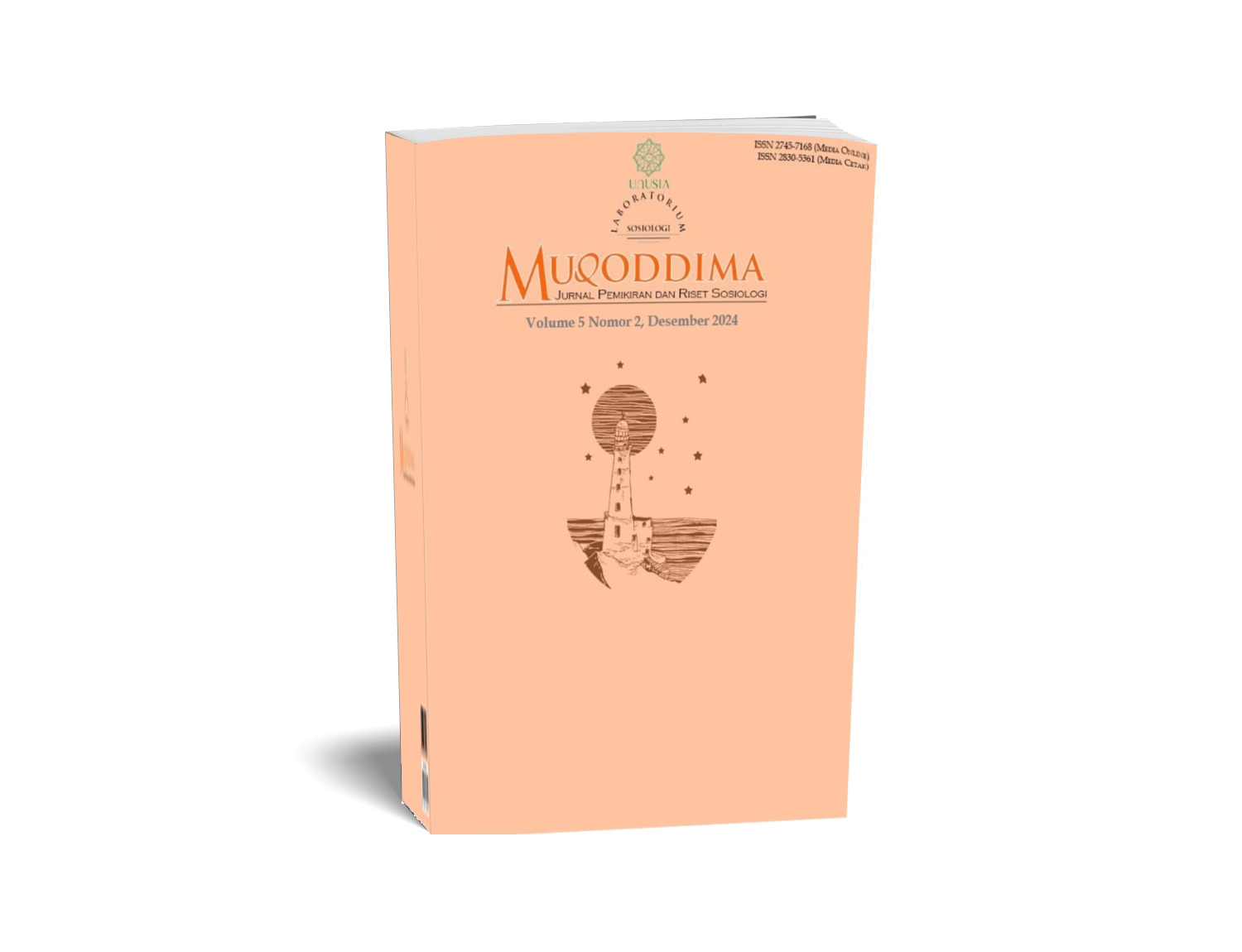Embodied Engagement, Context, and Objectivity: Science as a Human Social Practice
DOI:
https://doi.org/10.47776/MJPRS.005.02.08Keywords:
Science as Social Practice, Human Dimension, Objectivity, Values, Praxis of KnowingAbstract
Dominant perspectives in modern science assume that scientific knowledge is ideally value-free and neutral. This claim is problematic as it overlooks the fact that science is a social practice carried out by knowers—embodied, context-bound, and value-laden beings. This article, through the lens of critical realism and personalism, offers an alternative framework that understands science as a value-laden activity without abandoning its commitment to objective reality. A philosophical analysis, combined with two historical case studies—Imam al-Shafi‘i’s revision of Islamic jurisprudence and Copernicus’ scientific revolution—yields three main findings. First, scientific knowledge is fallible, as it is rooted in the limitations of human conditions. Second, scientific objectivity is achieved not by eliminating values, but through critical reflection on the positionality of values within scientific communities. Third, a fully humanized science is more capable of generating transformative and responsible knowledge. These findings offer important implications for epistemology, education, and contemporary scientific practice, particularly in rethinking the relationship between reality, values, and the knowing subject.
Downloads
References
Agazzi, Evandro. 2021. “The multiple aspects of the philosophy of science.” Axiomathes 31:677–693. https://doi.org/10.1007/s10516-021-09568-1. DOI: https://doi.org/10.1007/s10516-021-09568-1
Alimi, Moh. Yasir. 2018. Mediatisasi agama post-truth dan ketahanan nasional. Yogyakarta: LKiS.
Alderson, Priscilla. 2021. “Health, illness and neoliberalism: An example of critical realism as a research resource.” Journal of Critical Realism 20(5):542–556. https://doi.org/10.1080/14767430.2021.1995689. DOI: https://doi.org/10.1080/14767430.2021.1995689
Alderson, Priscilla, and John Morgan. 2022. “Realist by inclination, childhood studies, dialectic and bodily concerns: An interview with Priscilla Alderson.” Journal of Critical Realism 22(1):122–159. https://doi.org/10.1080/14767430.2022.2068261. DOI: https://doi.org/10.1080/14767430.2022.2068261
Alderson, Priscilla, Kate Sutcliffe, and Ricardo Mendizabal. 2020. “A critical realist analysis of consent to surgery for children, human nature and dialectic: The pulse of freedom.” Journal of Critical Realism 19(2):159–178. https://doi.org/10.1080/14767430.2020.1733922. DOI: https://doi.org/10.1080/14767430.2020.1733922
Archer, Margaret. 2000. Being human: The problem of agency. Cambridge: Cambridge University Press. DOI: https://doi.org/10.1017/CBO9780511488733
Archer, Margaret, Roy Bhaskar, Andrew Collier, Tony Lawson, and Alan Norrie, eds. 1998. Critical realism: Essential readings. 1st ed. London: Routledge.
Ayer, A. J. 1947. Language, truth, and logic. London: V. Gollancz Ltd.
Bhaskar, Roy. 2014. The possibility of naturalism: A philosophical critique of the contemporary human sciences. 4th ed. London: Routledge. DOI: https://doi.org/10.4324/9780203976623
Blumer, H. 1969. “The methodological position of symbolic interactionism.” Pp. 1–60 in Symbolic interactionism: Perspective and method, edited by H. Blumer. Englewood Cliffs, NJ: Prentice Hall.
Butterfield, Herbert. 1957. The origins of modern science, 1300-1800. 2nd ed. New York: Macmillan.
Carnap, Rudolf. 1967. The logical structure of the world and pseudoproblems in philosophy. Translated by Rolf A. George. Berkeley: University of California Press.
Churchland, Patricia S. 1986. Neurophilosophy: Toward a unified science of the mind-brain. Cambridge, MA: MIT Press. DOI: https://doi.org/10.7551/mitpress/4952.001.0001
Clark, Andy. 2008. Supersizing the mind: Embodiment, action, and cognitive extension. New York: Oxford University Press. DOI: https://doi.org/10.1093/acprof:oso/9780195333213.001.0001
Collier, A. 1999. Being and worth. 1st ed. London: Routledge.
Collier, A. 2003. In defence of objectivity. 1st ed. London: Routledge. DOI: https://doi.org/10.4324/9780203615041
Derrida, Jacques. 1997. Of grammatology. Baltimore, MD: Johns Hopkins University Press.
DeWild, Dale. 2017. “A comparison of the views of Charles Taylor and Christian Smith on human nature.” Journal of Sociology and Christianity 7(1). Retrieved May 6, 2025 (https://sociologyandchristianity.org/index.php/jsc/article/view/91).
Donati, Pierpaolo. 2019. “Discovering the relational goods: Their nature, genesis and effects.” International Review of Sociology 29(2):238–259. https://doi.org/10.1080/03906701.2019.1619952. DOI: https://doi.org/10.1080/03906701.2019.1619952
Douglas, Heather E. 2009. Science, policy, and the value-free ideal. Pittsburgh: University of Pittsburgh Press. DOI: https://doi.org/10.2307/j.ctt6wrc78
Feyerabend, Paul. 1975. Against method: Outline of an anarchistic theory of knowledge. Atlantic Highlands, NJ: Humanities Press.
Foucault, Michel. 1972. The archaeology of knowledge. Translated by A. M. Sheridan Smith. New York: Pantheon Books.
Foucault, Michel. 1980. "Truth and power." Pp. 109–133 in Power/Knowledge: Selected Interviews and Other Writings, 1972–1977, edited by Colin Gordon. New York, NY: Pantheon Books.
Freire, Paulo. 2008. Pendidikan kaum tertindas. Translated by Tim Redaksi LP3ES. Jakarta: Pustaka LP3ES Indonesia. [Translation of Pedagogy of the oppressed, Penguin Books, 1972.]
Gallagher, Shaun. 2005. How the body shapes the mind. Oxford: Oxford University Press. DOI: https://doi.org/10.1093/0199271941.001.0001
Gergen, Kenneth J. 2001. Social construction in context. London: SAGE Publications. DOI: https://doi.org/10.4135/9781446219645
Gingerich, Owen. 2004. The Book Nobody Read: Chasing the Revolutions of Nicolaus Copernicus. Penguin.
Goddu, André. 2010. Copernicus and the Aristotelian Tradition. Brill. DOI: https://doi.org/10.1163/ej.9789004181076.i-548
Gorski, Philip S. 2020. American Babylon: Christianity and democracy before and after Trump. Oxford: Oxford University Press. DOI: https://doi.org/10.4324/9780429318146
Hacking, Ian. 1999. The social construction of what? Cambridge, MA: Harvard University Press.
Hanson, Norwood Russell. 1958. Patterns of discovery: An inquiry into the conceptual foundations of science. Cambridge: Cambridge University Press.
Heidegger, Martin. 1962. Being and time. Translated by John Macquarrie and Edward Robinson. New York: Harper & Row. (Original work published 1927).
Ingold, Tim. 2000. The perception of the environment: Essays on livelihood, dwelling and skill. London: Routledge.
Jones, Alexander. 2006. “Ptolemy’s Ancient Planetary Observations.” Annals of Science 63(3): 255-290 DOI: https://doi.org/10.1080/00033790600625427
Kleden, Ignas. 2017. “Prolog: Paradigma sains. Tantangan penelitian ilmu-ilmu sosial dan humaniora di Indonesia.” Pp. 1-132 in Paradigma sains dan penelitian ilmu-ilmu sosial dan humaniora di Indonesia, edited by I. Kleden and T. Abdullah. Jakarta: LIPI Press.
Knorr Cetina, Karin. 1999. Epistemic cultures: How the sciences make knowledge. Cambridge, MA: Harvard University Press. DOI: https://doi.org/10.4159/9780674039681
Knorr-Cetina, Karin. 1981. The manufacture of knowledge: An essay on the constructivist and contextual nature of science. Oxford and New York: Pergamon Press.
Koestler, Arthur. 1959. The Sleepwalkers: A History of Man’s Changing Vision of the Universe. London: Hutchinson.
Kourany, Janet A. 2021. “Bacon's promise.” Pp. [halaman jika diketahui] in Science, freedom, democracy, edited by P. Hartl and Á. T. Tuboly. London: Routledge.
Kourany, Janet A. 2024. “The two ideals shaping the content of modern science.” Synthese 203:167. https://doi.org/10.1007/s11229-024-04554-7. DOI: https://doi.org/10.1007/s11229-024-04554-7
Kuhn, Thomas S. 1962. The structure of scientific revolutions. Chicago: University of Chicago Press.
Lahaji, L., and N. E. Muhammad. 2015. “Qaul qadim dan qaul jadid Imam Syafi’i: Telaah faktor sosiologisnya.” Al-Mizan (e-Journal) 11(1):119–135. https://doi.org/10.30603/am.v11i1.993. DOI: https://doi.org/10.30603/am.v11i1.993
Lakoff, George, and Mark Johnson. 1999. Philosophy in the flesh: The embodied mind and its challenge to western thought. New York: Basic Books.
Latour, Bruno, and Steve Woolgar. 1986. Laboratory life: The construction of scientific facts. With a foreword by Jonas Salk. Princeton, NJ: Princeton University Press. DOI: https://doi.org/10.1515/9781400820412
Lindberg, David C. 2007. The beginnings of western science: The European scientific tradition in philosophical, religious, and institutional context, prehistory to A.D. 1450. 2nd ed. Chicago: University of Chicago Press. DOI: https://doi.org/10.7208/chicago/9780226482040.001.0001
Lindberg, David C., and Ronald L. Numbers. 1986. God and nature: Historical essays on the encounter between Christianity and science. University of California Press. DOI: https://doi.org/10.1525/9780520908031
Longino, Helen E. 2002 [1990]. Science as social knowledge: Values and objectivity in scientific inquiry. Princeton: Princeton University Press.
Longino, Helen. 2019. “The social dimensions of scientific knowledge.” The Stanford Encyclopedia of Philosophy (Summer 2019 Edition), edited by Edward N. Zalta. Retrieved from https://plato.stanford.edu/archives/sum2019/entries/scientific-knowledge-social/.
Lyotard, Jean-François. 1984. The postmodern condition: A report on knowledge. Translated by Geoff Bennington and Brian Massumi. Manchester: Manchester University Press. DOI: https://doi.org/10.2307/1772278
Merleau-Ponty, Maurice. 1962. Phenomenology of perception. London: Routledge & Kegan Paul.
Merleau-Ponty, Maurice. 2002. Phenomenology of perception. Translated by Colin Smith. London and New York: Routledge. (Original work published 1945).
Mooney, Margarita A. 2016. “Human agency and mental illness.” Journal of Critical Realism 15(4):376–390. https://doi.org/10.1080/14767430.2016.1193675. DOI: https://doi.org/10.1080/14767430.2016.1193675
Nawirman, Kurniati, Misbahuddin, and Nurchamidah. 2023. “Sociological factors of Imam Syafi’i’s qaul qadim and qaul jadid.” Al-Afkar, Journal for Islamic Studies 6(4):321–333. https://doi.org/10.31943/afkarjournal.v6i4.739.
Neugebauer, Otto. 1975. A history of ancient mathematical astronomy. Springer DOI: https://doi.org/10.1007/978-3-642-61910-6
Pigden, Charles R., ed. 2010. Hume on is and ought. Basingstoke, UK: Palgrave Macmillan. DOI: https://doi.org/10.1007/978-0-230-29688-6
Polanyi, Michael. 1962. Personal knowledge: Towards a post-critical philosophy. Chicago: University of Chicago Press. (Original work published 1958).
Porpora, Douglas V. 2019. “A reflection on critical realism and ethics.” Journal of Critical Realism 18(3):274–284. https://doi.org/10.1080/14767430.2019.1618064. DOI: https://doi.org/10.1080/14767430.2019.1618064
Poerwandari, Kristi. 2017. “Penelitian kajian perempuan dan gender: Paradigma dan karakteristik.” Pp. 505-539 in Paradigma Sains dan Penelitian Ilmu-ilmu Sosial dan Humaniora di Indonesia, edited by I. Kleden and T. Abdullah. Jakarta: LIPI Press
Purwanto, Muhammad Roy. 2017. Pemikiran Imam al-Syafi’i dalam Kitab al-Risalah tentang qiyas dan perkembangannya dalam ushul fiqh. Yogyakarta: Universitas Islam Indonesia.
Rosen, Edward. 1992. Nicholas copernicus: On the revolutions. Johns Hopkins University Press
Rorty, Richard. 1980. Philosophy and the mirror of nature. Princeton, NJ: Princeton University Press.
Rorty, Richard. 1989. Contingency, irony, and solidarity. Cambridge: Cambridge University Press. DOI: https://doi.org/10.1017/CBO9780511804397
Sayer, Andrew. 2011. Why things matter to people: Social science, values and ethical life. Cambridge: Cambridge University Press. DOI: https://doi.org/10.1017/CBO9780511734779
Schroeder, Mark J. 2020. “Contemporary natural philosophy and contemporary idola mentis.” Philosophies 5(3):19. https://doi.org/10.3390/philosophies5030019. DOI: https://doi.org/10.3390/philosophies5030019
Schwartz, Pedro. 2020. “Hume's guillotine.” Adam Smith Works, Liberty Fund. Retrieved from https://www.adamsmithworks.org/documents/hume-s-guillotine.
Smith, Christian. 2010. What is a person? Rethinking humanity, social life, and the moral good from the person up. Chicago: University of Chicago Press. DOI: https://doi.org/10.7208/chicago/9780226765938.001.0001
Smith, Peter J. 2021. “On the possibility of knowledge: Skeptical arguments and Baconian idols.” Pp. 31–48 in Sceptical doubt and disbelief in modern European thought, edited by V. R. Rosaleny and P. J. Smith. Vol. 233 of International Archives of the History of Ideas. Cham: Springer. https://doi.org/10.1007/978-3-030-55362-3_3. DOI: https://doi.org/10.1007/978-3-030-55362-3_3
Szabla, David B., and Susan F. Gaffney. 2024. “Francis Bacon: Prophet of science.” In The Palgrave handbook of educational thinkers, edited by B. A. Geier. Cham: Palgrave Macmillan. https://doi.org/10.1007/978-3-031-25134-4_26. DOI: https://doi.org/10.1007/978-3-031-25134-4_26
Wynne, Brian. 1996 [1992]. “Misunderstood misunderstandings: Social identities and public uptake of science.” Pp. 19–46 in Misunderstanding science?: The public reconstruction of science and technology, edited by A. Irwin and B. Wynne. Cambridge: Cambridge University Press. DOI: https://doi.org/10.1017/CBO9780511563737.002
Westman, Robert S. 2011. The Copernican question: Prognostication, skepticism, and celestial order. Berkeley: University of California Press. DOI: https://doi.org/10.1525/9780520948167
Wilkinson, Matthew L. N. 2015. A fresh look at Islam in a multi-faith world: A philosophy for success through education. Milton Park, Abingdon, Oxon: Routledge. DOI: https://doi.org/10.4324/9781315745657
Downloads
Published
Issue
Section
License
Copyright (c) 2024 Muhammad Nurul Huda , Amsar A. Dulmanan

This work is licensed under a Creative Commons Attribution 4.0 International License.







